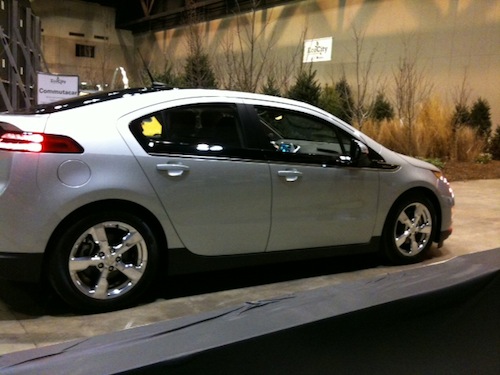Taking the Chevy Volt for a Spin

A new section at the 2011 St. Louis Auto Show is called EcoCity. Here show visitors can get behind the wheel of one of several hybrid cars or one of the not available in Missouri Chevy Volt electric car. I haven’t been to an auto show in years but new greener vehicles got me there yesterday.

Because I require a spinner knob to safely steer a vehicle, even at 5mph, I rode shotgun as the next person in line drove the two laps.
httpv://www.youtube.com/watch?v=dj1pcOdF3II

The company that killed the electric car has done an impressive job of bringing it back to life. More on the auto show tomorrow.
– Steve Patterson
Here is a great story on trying to charge the Volt in NYC. It's not a bad car, but it will be a while before the infrastructure is set up for these types of cars.
http://jalopnik.com/5741987/ne…
Agree that infrastructure is virtually nonexistent. Disagree that public charging stations are the best solution. Also question whether all electric is actually cleaner or greener, especially around here, where there's virtually no solar or hydroelectic production, just fossil fuels, primarily coal, with some natural gas and nuclear. The bggest advantage (currently) with electric vehicles is that you avoid paying the gas taxes everyone else pays at the pump. This will change, as more hybrids and all-electrics hit the road, since it costs government the same to patch the potholes, rebuild the bridges or plow the snow for a Volt, a Leaf, a Tahoe or an F-150. Look to start paying for miles driven instaed of gallons consumed – Oregon is leading the way: http://www.oregon.gov/ODOT/HWY…
That said, it appears that GM has done a great job on the Volt, and hopefully its cost will drop as production increases. I'm also really interested to see how it compares to the just announced plug-in Prius. Both seem like better choices than the Nissan Leaf, since they can be electric-only daily-commuter vehicles AND high-mileage vehicles for longer road trips.
I definitely agree with your last point. Cars like the Nissan Leaf, are not feasible for most people, especially with the non-existent infrastructure. The Volt will hopefully lead the way in helping to establish the infrastructure, which will make pure-electric cars viable in the future.
Good point JZ71, Transportation Advocates have been pushing for a per mile tax for years as the only meaningful way to reform and match usage with the cost of maintaining the road network. Technology could make this feasible as well as factor in weight of vehicle and its about as fair as you are going to get. Unfortunately, politics is not about boldness but getting to the next election.
From a political and logical point of view you would think the idea of paying for what you use makes sense. Drive more miles pay for more of the road. However, what I fear is that the price of gas will rise to the point that the solution will be to drop the gas tax altogether. I'm still amazed for McCain to propose such a stopgap during the last election.
Paying for what you use does make sense, but having the government know where you are, where you've been, and when (a critical component of per mile taxes) is THE big hurdle. Just look at the blowback on redlight cameras!
I'm wondering if the actual mileage will be equal to the hyped mileage.
Well, Volts are on the road now and a quick google search comes up with many reviews. The first one I read: “In the end we traveled 155.7 miles, 60.9 on electricity and used 2.55 gallons of gas. Total fuel economy for this trip thus was 61.1 mpg.”
One thing to remember is that most of the electric vehicles also weigh 20-30% less than internal combustion vehicles. This could/should be accounted for when talking about their wear-and-tear on the roads. Glad to see the crowds around the volt and not the corvette…
Weight is a separate issue, and one where trucks do do exponentially more damage. Where light vehicles are “equals” is in the areas of congestion and snow removal. It doesn't matter if the average vehicle weight during rush hour is 3,500 lbs or 6,000 lbs, the problem is limited real estate for all those single-occupant vehicles. The same goes for salting and plowing – a lane is a lane . . . .
While appreciate thoughts, cars weight on roads is negilible. Highways are designed based on truck weights. The second big issue with road design is water in the subbase that expands with freeze/thaw cycles. The voids left behind because of this is the root cause of potholes. Not your typically wear and tear from above.
My wife and I moved and both commute. When moved we kept hers short and mine is on the long side – 35 miles or so. The reality is that a car for all pratical purpose is my best option as transit just requires to many connecting the dots and the thought of spending an extra one to two hours at a minimum away from the family during the day is not to going happen if I can help it. Sorry transit advocates, A car for me will win over transit as long as it is quicker and I can afford it just for the sake of having more time with my family.
In that context, I hope to get in a volt or something comparable in about two years for a couple of reasons. First, will need to replace my car in about that time and should be comfortable in knowing if my latest career move will be with me for a while or I will be with it for a while. However, the biggest reason is that the Volt or something comparable will finally give drivers in my situation, daily commutes in an urban area, real choice on whether you want to go with oil or fuel your commute through the grid or maybe even a house top/employer solar installation. I believe this will become very meaningful when a lot of investment bankers are forecasting $150 per barrel oil by 2015. Especially in a country with such a massive road infrastructure in place already and the build out of transit everywhere and anywhere could not happen fast enough as well as the political reality of not getting enough money to make it.
Don't have no desire for the Leaf. However, the volt would be about right and hopefully my employer would have a charger station by then.
Being the cynical libertarian, why would your employer want to install charging stations? Would you be willing to include its cost as a part of your overall compensation package? Replacing, for example, say, dental insurance? Or, to put it another way, why should you be getting a perk that few of your fellow employees would want and/or could use?!
FYI, The Volt is not an “electric car”, it's a regular hybrid. Despite what Chevy's slick PR campaign might say about it. Though you could go as far as calling it a “plug in” hybrid. The Volt's engine CAN in fact directly drive the wheels. Chevy's own engineers have even admitted that GM's claims that the gas engine only turns generators to charge the batteries is false.
On another note, the StL car show was a joke. Leaf was locked up, Volt, Fiesta and other sensible cars were all on pedestals where you couldn't get to them.. And where was BMW? Audi? Mini? Smart? or the concept cars?
There sure were a lot of bigass trucks and vans though.
To counter other's comments about the Leaf not being practical, I'd suggest looking at the statistics for the average persons commute. More than practical, even if you ran some errands after work. It gets even more promising in 2-car households, where one person could drive the all-electric vehicle, and the other would have a long-range diesel (or preferably a diesel-electric hybrid) powered car for extended drives.
I agree with you concerning the Volt. It isn’t an electric cart as GM claims. I like the Leaf – the concept is great. It would be good for someone who doesn’t drive a lot – but the range needs to be better. I am seriously thinking about a VW TDI (Turbo Direct Injection). The only minus is the current price of diesel. However, the vehicle that I currently have uses 87 but has a 20 gallon tank and gets around 23/24 (minivan) – the Jetta has a 14 gallon tank and is suppose to get 30 city and 42 highway. Other posts I have read are quoting much high mileage numbers that VW is slating. Someone I know at work has one got 46 miles to the gallon on an extended trip. Its a lot to think about – but it won’t be a Volt – don’t trust GM. Any company that makes you pay for a spare tire has probably cut some more corners as well.
I agree with you concerning the Volt. It isn’t an electric cart as GM claims. I like the Leaf – the concept is great. It would be good for someone who doesn’t drive a lot – but the range needs to be better. I am seriously thinking about a VW TDI (Turbo Direct Injection). The only minus is the current price of diesel. However, the vehicle that I currently have uses 87 but has a 20 gallon tank and gets around 23/24 (minivan) – the Jetta has a 14 gallon tank and is suppose to get 30 city and 42 highway. Other posts I have read are quoting much high mileage numbers that VW is slating. Someone I know at work has one got 46 miles to the gallon on an extended trip. Its a lot to think about – but it won’t be a Volt – don’t trust GM. Any company that makes you pay for a spare tire has probably cut some more corners as well.